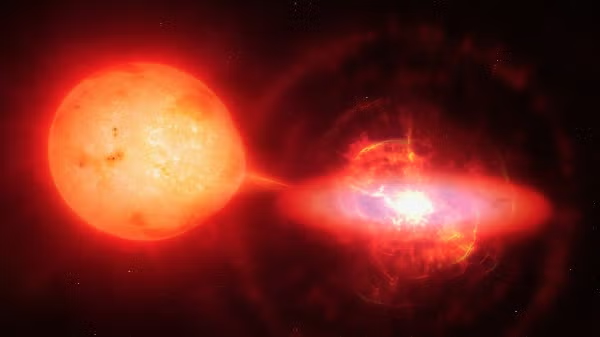NSF grant allows ASU researchers to develop streaming technologies for molecular simulations

Diagram showing streaming analysis pathway. Image courtesy Matthias Heyden
Matthias Heyden, assistant professor in the School of Molecular Sciences at Arizona State University, has been awarded $600,000 by the National Science Foundation as principal investigator, along with Oliver Beckstein as co-principal investigator, to develop a software platform that simplifies the analysis of simulated molecular processes with a variable time resolution.
Due to advances in computer hardware, molecular simulations have become an increasingly powerful tool for investigating chemical, biochemical and biological processes with atomic-level detail. All-atom molecular dynamics simulations model the intricate motions of millions of atoms in complex systems, capturing the working mechanisms of molecular machines that are essential to living organisms while providing microscopic interpretations for experimental measurements.
However, these simulations generate huge amounts of data that can require very large storage capacities. Even simulations of moderately sized systems with 100,000 atoms moving at microsecond time scales generate over 1,000 terabytes of data at the time resolution needed for advanced analysis methods developed in Heyden’s lab. Larger molecular systems and utilization of additional information beyond atom positions requires even more storage capacity, too much even for modern supercomputers. Consequently, in current state-of-the-art simulations, a large fraction of the generated information is routinely discarded and not stored or analyzed.
Heyden and Beckstein have developed a way to capture and analyze data during a simulation without requiring storage on hard disks, allowing researchers to access information that would normally be lost or difficult to obtain.
“In this project,” Heyden said, “we develop an alternative solution, which does not require the need for permanent or temporary storage of large amounts data, and the associated writing and reading processes, while ensuring that no loss of information occurs. Instead of writing data to hard disks for later processing, we develop the software infrastructure that allows other programs to analyze the data generated by a molecular dynamics simulation while it is still running.”
This technology is commonly called “streaming” and ensures that all data generated during a molecular-dynamics simulation can be maximally utilized for any potential scientific analysis. The simulation transfers its data for immediate processing to a distinct program or device while it is running, avoiding the need to store the entire simulation trajectory, e.g., the history of all-atom coordinates during the simulation.
The final version will be able to stream molecular dynamics trajectories generated by all leading, open-source software packages in the field and thus ensures that users all over the world will be able to maximize the information output of their simulations.
The research team at ASU will be collaborating with the developers of the MDAnalysis project to implement the streaming approach in the MDAnalysis library, one of the most widely used software frameworks for the analysis and manipulation of molecular simulation data. The new approach will become available to the thousands of users of MDAnalysis and benefit computational projects on enzyme design and drug development.
More Science and technology

Stuck at the airport and we love it #not
Airports don’t bring out the best in people.Ten years ago, Ashwin Rajadesingan was traveling and had that thought. Today, he is…

ASU in position to accelerate collaboration between space, semiconductor industries
More than 200 academic, business and government leaders in the space industry converged in Tempe March 19–20 for the third annual…

A spectacular celestial event: Nova explosion in Northern Crown constellation expected within 18 months
Within the next year to 18 months, stargazers around the world will witness a dazzling celestial event as a “new” star appears in…

